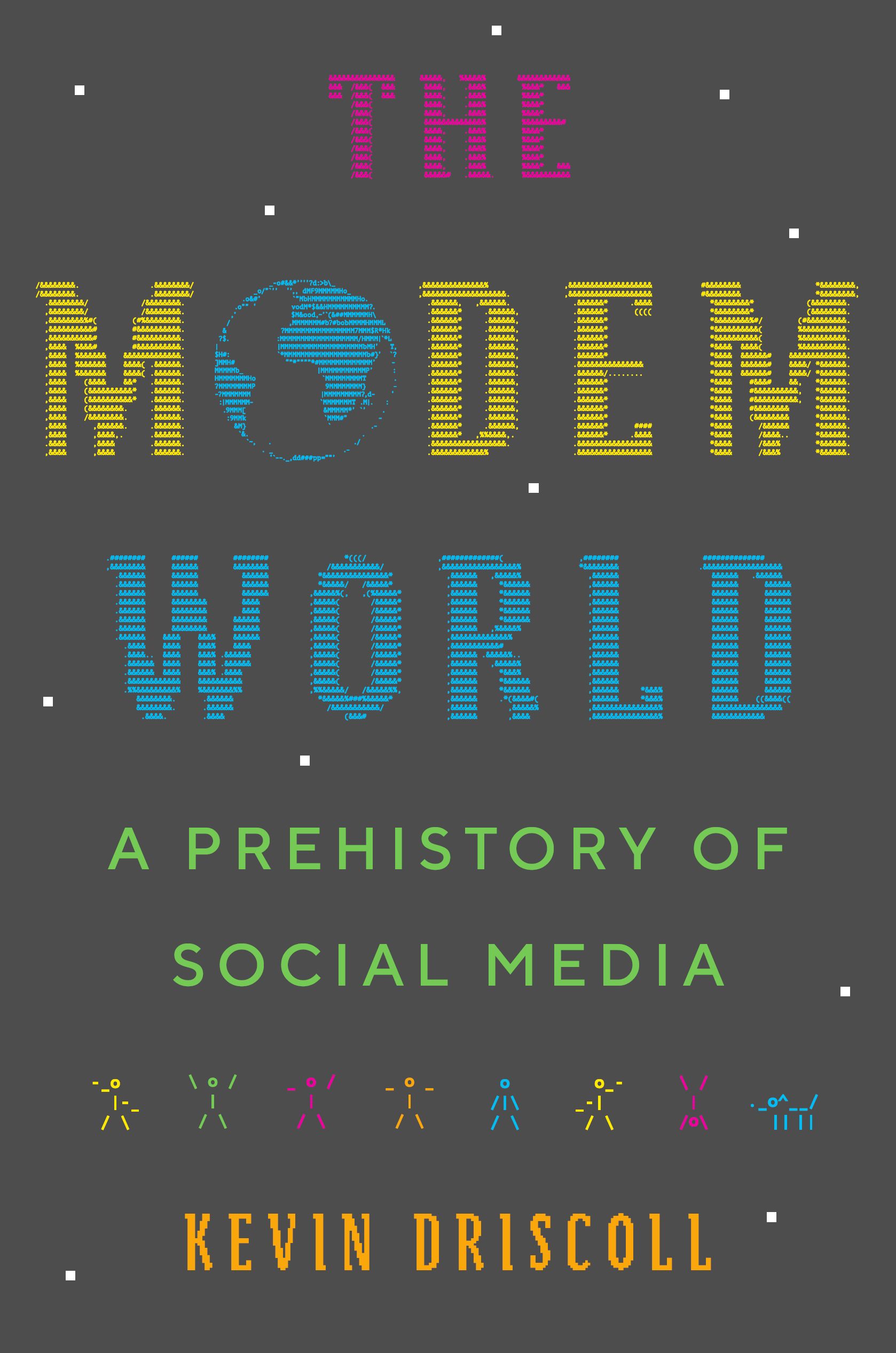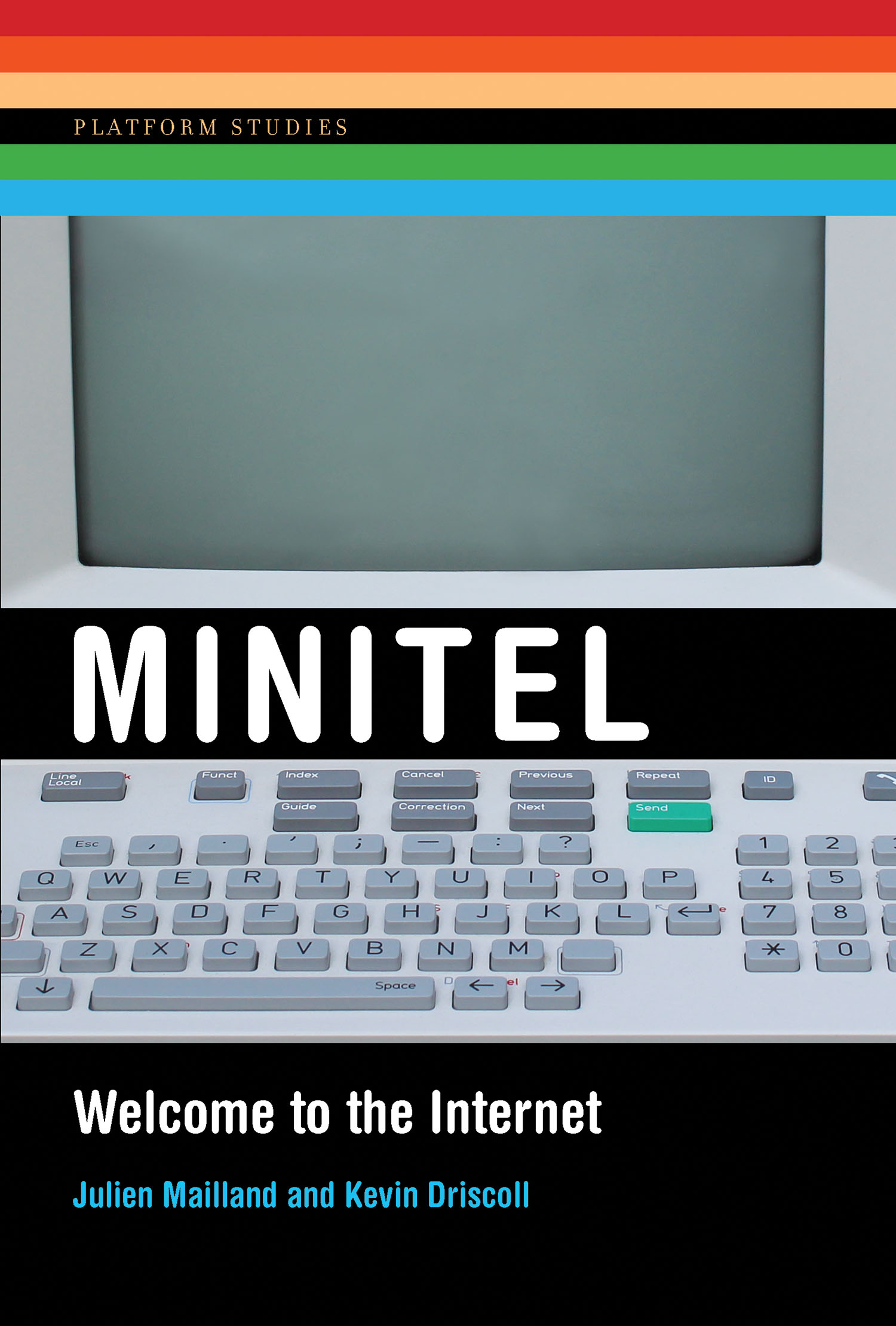Kevin Driscoll is an Associate Professor in the Department of Media Studies at the University of Virginia. (CV)
Research
Popular computing
My latest book, The Modem World: A Prehistory of Social Media, tells a story about how the internet became social and why this matters for its future. The book will be published by Yale University Press in April 2022 and is available for pre-order now from all your favorite booksellers.
The Modem World offers an alternative origin story for the internet. In the place of military contractors, university researchers, or Silicon Valley entrepreneurs, the book is organized around a distributed network of more than 100,000 bulletin board systems, or BBSs, operated by amateurs, activists, educators, and entrepreneurs across North America during the 1980s and 1990s. The social and technical contributions of this grassroots community laid the groundwork for the transnational internet that we rely on today.
I am especially interested in comparative histories of the Net that look beyond North America. In 2017, Julien Mailland and I published, Minitel: Welcome to the Internet, about the technology, culture, and political-economy of the pioneering French videotex system. We continue to maintain a digital archive and online museum: The Minitel Research Lab, USA.
Related publications
- Driscoll, K., Fridzema, N., & Shchetvina, A. (2025). Early internet history, archival research and imaginaries as "spaces of possibility". Matter of Imagination, April 29.
- Driscoll, K. (2023). Do We Misremember Eternal September?. Flow, 29, 6.
- Driscoll, K. (2022). They thought advertising would make the internet free. Flow, 29, 2.
- Driscoll, K. (2022). The Modem World: A Prehistory of Social Media. Yale University Press.
- Driscoll, K. (2020). Losing Your Internet: Narratives of Decline among Long Time Users. In Metaphors of Internet: Ways of Being in the Age of Ubiquity edited by Annette N. Markham and Katrin Tiidenberg, 25-32. (PDF)
- Nooney, L., Driscoll, K., and Allen, K. (2020). From Programming to Products: Softalk Magazine and the Rise of the Personal Computer User. Information & Culture, 55, 2, 105-129. (PDF, data, code)
- Driscoll, K. (2020). Demography and Decentralization: Measuring the Bulletin Board Systems of North America. WiderScreen, 23, 2-3. (HTML)
- Driscoll, K. (2019). "Thou Shalt Love Thy BBS": Distributed Experimentation in Community Moderation. In Computer Network Histories: Hidden Streams From the Internet Past, edited by Paolo Bory, Gianluigi Negro, and Gabriele Balbi, 15-34. Histoire et Informatique / Geschichte Und Informatik. Zürich, Switzerland: Chronos Verlag, 2019. (PDF)
- Driscoll, K. (2019). Cooperative mode for amateur and academic game histories. ROMchip: A Journal of Game Histories, 1, 1. (HTML)
- Driscoll, K. and Mailland, J. (2019). From trash to treasure: Turn a Minitel terminal into a Linux terminal or videotex display. IEEE Spectrum, 56, 3: 16-17. doi:10.1109/MSPEC.2019.8651924. (HTML)
- McKelvey, F. and Driscoll, K. (2018). ARPANET and its boundary devices: Modems, IMPs, and the inter-structuralism of infrastructures. Internet Histories. doi:10.1080/24701475.2018.1548138. (PDF)
- Mailland, J. and Driscoll, K. (2017). Minitel: Welcome to the Internet. The MIT Press.
- Mailland, J. and Driscoll, K. (2017). Minitel: The Online World France Built Before the Web. IEEE Spectrum, 54, 7: 32-37. doi:10.1109/MSPEC.2017.7951720 (PDF)
- Driscoll, K. and Paloques-Berges, C. (2017). "Searching for missing 'net histories'". Internet Histories, 1, 1, 1-13. doi:10.1080/24701475.2017.1307541. (preprint). (Russian translation by Leonid Yuldashev, 2020)
- Modems Matter: From 300 Baud to 56K, fanzine, 2016. (printable).
- Driscoll, K. (2016). "Social Media's Dial-Up Ancestor: The Bulletin Board System". IEEE Spectrum, 53, 11: 54-60. doi:10.1109/MSPEC.2016.7607028. (PDF). (Traddución al español por Nicolás Quiroga, 2018)
- Driscoll, K. (2015). Professional work for nothing: Revisiting Bill Gates' "An Open Letter To Hobbyists.". Information & Culture, 50, 2. doi:10.1353/lac.2015.0005. (preprint)
- Brunton, F., Driscoll, K., and Gillespie, T. (2014). Spam, and the Challenge of Chasing Shadows. Journal of Broadcasting & Electronic Media, 58, 4. doi:10.1080/08838151.2014.966366. (PDF)
- Driscoll, K. (2014). Hobbyist Inter-Networking and the Popular Internet Imaginary: Forgotten Histories of Networked Personal Computing, 1978-1998. Dissertation, University of Southern California.
- Driscoll, K. (2012). From Punched Cards to "Big Data": A Social History of Database Populism. communication +1, 1, 4.
- Mailland, J. and Driscoll, K, Minitel Terminal as a Twitter Client (June 29, 2012). 2012 TRPC.
- Driscoll, K., and Diaz, J. (2009). Endless loop: A brief history of chiptunes. Journal of Transformative Works and Cultures, 2. doi:10.3983/twc.2009.0096.
Political talk online
I'm also working on a number of projects related to popular culture and political talk online with my former colleagues from USC including François Bar, Dayna Chatman, Lian Jian, Jieun Shin, and Kjerstin Thorson. Using a combination of macro-scale computational methods (thematic clustering, natural language processing) and micro-scale textual analysis, we have explored rumor diffusion and de-bunking, humor and live-tweeting during televised presidential debates, and the interrelationship of Black Twitter and Scandal fandom.
Related publications
- Driscoll, K., Leavitt, A., Guth, K. L., Bar, F., & Mehta, A. (2018). Beyond Big Bird, Binders, and Bayonets: Humor and Visibility Among Connected Viewers of the 2012 US Presidential Debates. Social Media + Society, 4(1), 2056305118761201. (PDF)
- Shin, J., Jian, L., Driscoll, K. and Bar, F. (2018). The Diffusion of Misinformation on Social Media: Temporal Pattern, Message, and Source. Computers in Human Behavior 83: 278-87. doi:10.1016/j.chb.2018.02.008. (PDF)
- Shin, J., Jian, L., Driscoll, K., & Bar, F. (2016). Political Rumoring on Twitter During the 2012 US Presidential Election: Rumor Diffusion and Correction. New Media and Society. doi:10.1177/1461444816634054. (PDF)
- Driscoll, K. & Thorson, K. (2015). Searching and Clustering Methodologies: Connecting Political Communication Content Across Platforms. The ANNALS of the American Academy of Political and Social Science, 659, 1, 134-148. doi:10.1177/0002716215570570. (PDF)
- Driscoll, K. & Walker, S. (2014). Working within a black box: Transparency in the collection and production of big Twitter data.. International Journal of Communication, 8.
- Vraga, E. K., Bode, L., Wells, C., Driscoll, K., & Thorson, K. (2014). The rules of engagement: Comparing two social protest movements on YouTube. Cyberpsychology, Behavior, and Social Networking, 17, 133-140. (Available upon request.)
- Swartz, L. and Driscoll, K. (2014). "I hate your politics but I love your diamonds": The Web-based Interest-driven Messageboard as DIY Infrastructure. In M. Boler & M. Ratto (Eds.), DIY Citizenship, Cambridge, MA: MIT Press. (preprint)
- Thorson, K., Driscoll, K., Ekdale, B., Edgerly, S., Thompson, L. G., Schrock, A., Swartz, L., Vraga, E. K., and Wells, C. (2013). YouTube, Twitter and the Occupy Movement: Connecting Content and Circulation Practices. Information, Communication & Society. doi:10.1080/1369118X.2012.756051. (PDF)
Other artifacts
- 'Car-light' families in C'ville are trading car trips for e-bike rides, C-VILLE, September 24, 2025.
- RIP AOL dial-up internet, Press Play with Madeleine Brand, KCRW, August 14, 2025.
- "Can we think of coding as casting spells?", Witches, MoMA R&D Salon 55, Museum of Modern Art, June 17, 2025.
- Dialed In: A Prehistory of Social Media, with danah boyd and Marc Weber, Computer History Museum, April 25, 2024. [Full video]
- Ancient Technopagans, S1E2, Magic in the United States podcast, PRX, October 31, 2023.
- Abandonware "After Dark"—How Fair Use Powers Media Studies, The Taper: Copyright and Information Policy at the UVA Library, 2023.
- Topic 520: Kevin Driscoll: The Modem World: A Prehistory of Social Media, Inkwell, The WELL, 2022.
- The Prehistory of Social Media: BBSes and the future of the net (with Kevin Driscoll), Al's Geek Lab, 2022.
- Community & Technology with Kevin Driscoll, WHCR 90.3 FM, 2022.
- Kevin Driscoll: Modem World Convergence, Plutopia News Network, podcast, 2022.
- What life on the internet was like at 300 bits per second, Engadget, 2022.
- DEPECHE MODEM w/ Kevin Driscoll on early net culture (NM44), New Models podcast, 2022.
- The Internet Origin Story You Known Is Wrong, Wired, 2022.
- Kevin Driscoll: The Modem World, Plutopia News Network, podcast, 2022.
- Kevin Driscoll on Minitel and BBS, Reimagining the Internet podcast, 2022.
- Nuraan Davids, Karolyn Tyson, Kevin Driscoll, Magali Della Sudda, Veronica Terriquez, and Vivian Zayas, White privilege: What it is, what it means and why understanding it matters, The Conversation, 2021.
- Polaroid portrait from my old studio, taken by Mikael Kennedy, 2007.
- Minitel Research Lab Interview, Advent of Computing podcast, 2019.
- Participatory Politics in an Age of Crisis: Kevin Driscoll & Pablo Martínez-Zárate, Confessions of an Aca-Fan, 2019.
- Julien Mailland and Kevin Driscoll, Minitel: Welcome to the Internet, interview with Jasmine McNealy, New Books Network Podcast, 2017.
- Lana Swartz and Kevin Driscoll, "The Lonely Old Bitcoin Miner Touches Eternity Or, What is a Peer?, The King's Review, 2017.
- Julien Mailland and Kevin Driscoll, "Platforms in the Public Interest: Lessons from Minitel", Comparative Media Studies / Writing Podcast, MIT, 2017.
- Julien Mailland and Kevin Driscoll Talk Minitel, The MIT Press Blog, 2017.
- Review of Hacking Europe (edited by Gerard Alberts and Ruth Oldenziel), H-Soz-Kult, 2017.
- Before The Internet, There Was Minitel, 52 Insights, 2017.
- Review of Tung-Hui Hu's A Prehistory of the Cloud, Los Angeles Review of Books, 2016.
- Review of Payal Arora's The Leisure Commons: A Spatial History of Web 2.0, IEEE Annals of the History of Computing, 2016
- Spam, and the Challenge of Chasing Shadows, Culture Digitally, 2014.
- Review of Finn Brunton's Spam : A Shadow History of the Internet, Los Angeles Review of Books, 2013.
- Crowdfunding an archive: What's worth saving and who's gonna pay for it?, Civic Paths, 2013.
- Review of Evgeny Morozov's To Save Everything, Click Here, Los Angeles Review of Books, 2013.
- Soulja Boy and dance crazes, Spreadable Media Web Exclusive, 2013.
- The dark side of DIY: Makerspaces and the long, weird history of DIY hobbyists & military funding, Civic Paths, 2012.
- Conversations on epistemology and expertise, Culture Digitally Podcast, 2012.
- Code critique: "Altair music of a sort", Critical Code Studies Working Group, 2012.
- Protest code and the anti-SOPA blackout, Culture Digitally, 2012.
- This is what a broken internet feels like, Civic Paths, 2012.
Elsewhere on the www
- modem.world
- Research directory and digital archive dedicated to dial-up BBSs, FidoNet, and other amateur networks.
- Minitel Research Lab, USA
- Online archive of devices and ephemera related to the French network that ran continuously from 1982-2012.
- @driscoll@well.com
- Outpost on the fediverse for everyday chat and link sharing.
- @kdriscoll@aoir.social
- New fedi account on the Association of Internet Researchers (AOIR) instance.
- @kevindriscoll@twitter.com
- Twitter account for occasional professional updates.
- Zotero
- The most important piece of software in my research toolkit.
- Internet Archive
- Old computer books and magazines I've digitized and shared.
- Are.na
- Clippings, screenshots, and other ephemera from the modem world.
- Github
- Various software tools I've written for research.
- CueCat helper scripts
- Making practical use of an impractical device.
- Media history archives and collections
- Links to archives, libraries, museums, and other online collections for my media history students. Suggestions welcome!
- What were the earliest .edu domain names?
- Historical lists of dot-edu domains including very early domains and HBCUs.
- How to update the firmware on a Roland MS-1 sampler
- Reviving an underappreciated early digital sampler.
- Net neutrality research database
- Mapping the net neutrality controversy. a little dated but still useful.
- Alternative net histories timeline
- Experiment in using timelines to depict interwoven historical narratives.
- Feature Phone
- Scrapbook of weird phones and other mobile tech.
- Animated GIF Zoetrope
- Print and play on a standard turntable. (Warning: 13MB PDF!)
- Lone Wolf - Nightwind
- A mixtape of slowed trance music for late night driving.
- Pinboard
- Research-related bookmarks
- Web rings



